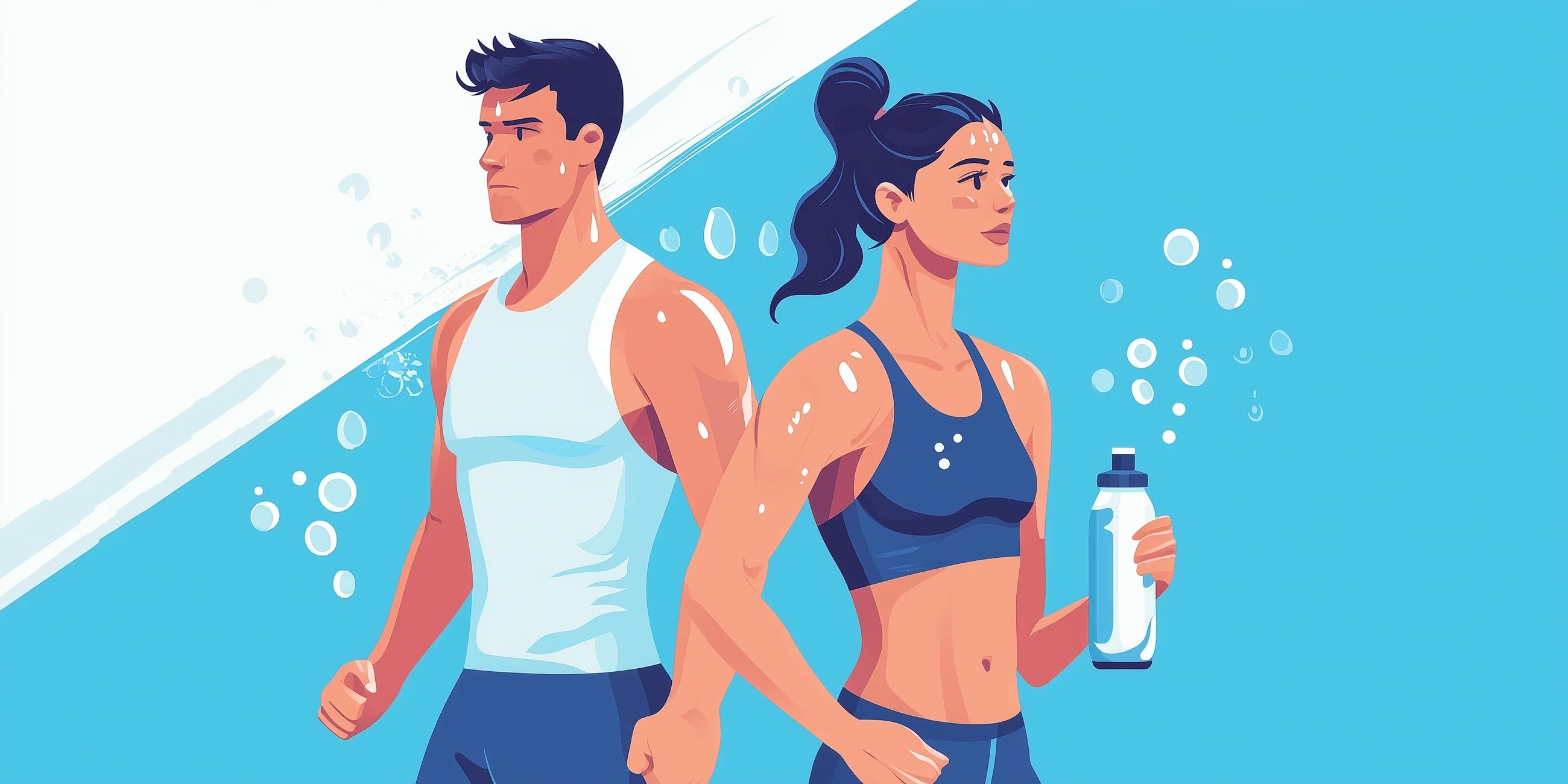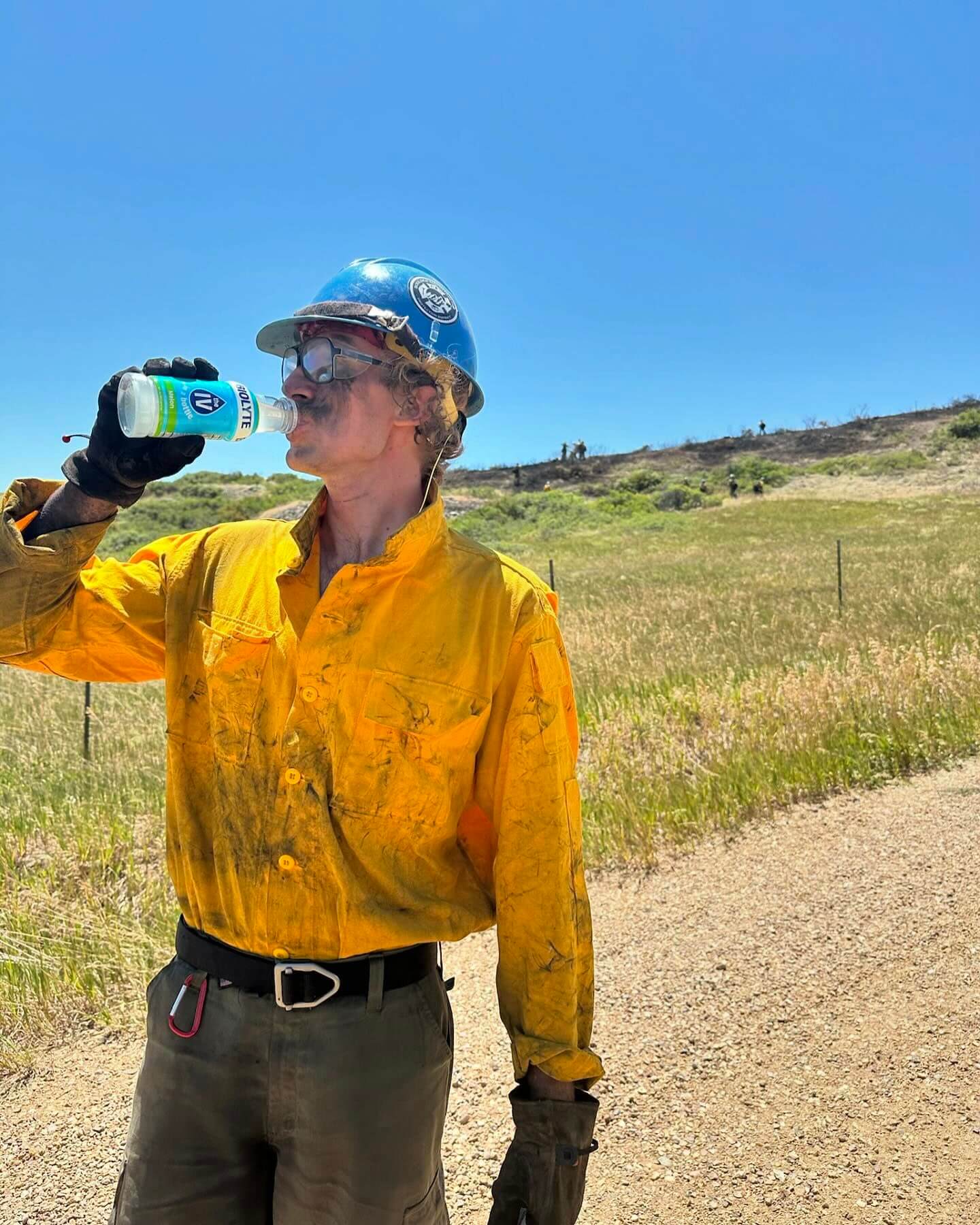HSA/FSA
Oral Rehydration Solutions: Are Electrolytes HSA/FSA Eligible?
Dehydration got you down? Rehydrate with your HSA or FSA.
October 22, 2024

Sam O'Keefe
Co-founder & CEO of Flex


Overview
Overview
Overview
Overview
We've all been there — feeling sluggish, light-headed, or downright drained after a tough workout, a long hike, or a bout of illness. Sometimes, water alone just doesn’t cut it.
Enter electrolytes and oral rehydration solutions (ORS), your saline saviors that help you bounce back by replacing the fluids and electrolytes your body needs.
In this article, we'll break down the basics of electrolytes, ORS, and their Health Savings Account (HSA) or Flexible Spending Account (FSA) eligibility so you can rehydrate smarter — and save up to 30 to 40% too.
What Are Oral Rehydration Solutions?
Oral rehydration solutions are over-the-counter (OTC) products designed to replenish fluids and electrolytes lost due to illness or dehydration. They’re also referred to as oral rehydration therapy or oral rehydration salts.
ORS are commonly found as powders or pre-mixed drinks and taken orally. They are at-home solutions that can be key to helping you recover if you're feeling drained from vomiting, diarrhea, or strenuous exercise.
What Is in Oral Rehydration Solutions?
Oral rehydration solutions are a mixture of several ingredients, which typically include:
Water: The base for hydration.
Electrolytes: Usually sodium (essential for electrolyte balance) and potassium (which helps maintain cell function).
Glucose: Supports the absorption of sodium and fluids.
Minerals: Magnesium or citrate may be included depending on the brand.
This combination allows your body to effectively take up the right balance of nutrients to combat dehydration.
Who are oral rehydration solutions for?
ORS is recommended for those with mild to moderate dehydration, and is a less invasive way to rehydrate compared to intravenous fluids.
In severe cases, if you're down 10% or more of your body weight due to dehydration, you’re likely headed for IV therapy. For most people, though, ORS is sufficient for recovery from dehydration before things get too serious.
What are electrolytes?
Electrolytes are essential minerals in your blood, urine, and other body fluids. They carry an electric charge that facilitates certain bodily functions, like helping to regulate nerve and muscle function, maintain fluid balance inside and outside your cells, and help rebuild damaged tissue.
Sodium, potassium, calcium, and magnesium are the main players.

Athletes, in particular, should be mindful of electrolyte loss. In cases of prolonged and intense exercise, it’s important to supplement water intake with electrolytes to maintain performance and avoid hyponatremia. Source: Saltivate
What Are Common Reasons You Might Need to Take Oral Rehydration Solutions or Electrolytes?
Historically, oral rehydration solutions were used to combat cholera and diarrheal diseases in developing countries. Nowadays, they are more commonly used to treat conditions that cause a rapid loss in water and essential minerals from the body, such as:
Dehydration from diarrhea or vomiting
Stomach viruses or viral infections
Travel-induced dehydration
Excessive sweating from intense physical activity or heat exposure
Using oral rehydration solutions for illness-related dehydration
Dehydration occurs when your body loses more fluid than you consume. This can result from illnesses that cause excessive diarrhea or vomiting.
When your body loses too much water, essential functions of the organs, cells, and tissues can start to fail. It only becomes more dangerous the more dehydrated you become.
For illness-related dehydration, the World Health Organization considers the replacement of lost fluid and electrolytes the cornerstone of therapy. Specifically, the formulation should emphasize intestinal absorption of sodium by coupling with glucose. This is the formula you will find in most over-the-counter (OTC) options.
The solution is simple and effective, especially in developing countries where oral rehydration therapy has been credited with saving up to 1 million lives per year.
Using oral rehydration solutions and electrolytes for sports
You may think that you’ll only need rehydration solutions in extreme cases… and you’re not wrong. But these cases can be more common than you may think, especially if you’re on vacation or in an area you’re unfamiliar with.
Case in point, a friend who is a hiking guide in Arizona has recounted plenty of stories of hikers who needed ORS after a big day hiking in the Grand Canyon or Zion National Park. Elevation, heat, and direct sun exposure can add up, especially when you’re not used to it.
Other examples for athletes might include summer training camps for sports or marathons or ultra-endurance events in hot weather.
In cases of prolonged and intense exercise, it’s especially important to supplement your water intake with electrolytes because of a particular condition that can occur, known as hyponatremia.
What is Hyponatremia and why you can't just drink water alone
Hyponatremia happens when you dilute the sodium in your body by drinking too much plain water without replacing lost sodium.
As a result of sodium imbalance, your cells begin to swell, leading to health problems such as confusion, seizures, or even death in extreme cases.
That’s why you need electrolytes, not just water, when dehydration strikes.
What are common signs of dehydration?
Even if you take preventative measures, you may still get dehydrated. Here are a few warning signs:
Extreme thirst
Dry mouth
Dark-colored urine
Fatigue
Dizziness or confusion
For a comprehensive list, the Mayo Clinic has an excellent resource here.
The key takeaway? The only effective treatment for dehydration is replacing lost fluids and electrolytes.

Dehydration occurs when your body loses more fluid than you consume, and can happen during strenuous activity or under extreme heat conditions. Source: Biolyte
Are Electrolytes and Oral Rehydration Solutions HSA/FSA Eligible?
The good news is that oral rehydration solutions, since they’re over-the-counter (OTC), are HSA and FSA eligible! You can grab a pack of ORS using your HSA or FSA funds without a prescription.
However, rehydration sports drinks (think Gatorade) and electrolyte solutions containing additional additives (such as caffeine, immunity boosters, or the like) are not eligible. Said another way, you can use your HSA or FSA funds on electrolyte-only hydration solutions and powders.
Electrolyte drinks aren’t just for adults, though.
Is Pedialyte HSA or FSA eligible?
Absolutely! Pedialyte is an oral electrolyte solution that helps children rehydrate during or after illness. As such, it is considered a qualified medical expense so you can use your HSA or FSA to pay for it.
Next are a few new takes on oral rehydration solutions, which you are HSA and FSA eligible.
Healthy Hydration Solutions of the Future
Many modern companies are transforming the way we think about hydration. Here are three trailblazers that you should know about.
Biolyte: The IV in a bottle
Biolyte is redefining hydration with its unique electrolyte drink, often called an “IV in a bottle”. Designed to rapidly restore fluids and electrolytes, it’s perfect for post-workout recovery or illness recovery.
Saltivate: Hydration with a flavorful twist
Saltivate offers electrolyte powders that deliver a perfect balance of hydration and taste without excess sugar. Their scientifically-formulated blends ensure you stay hydrated while enjoying delicious flavors, which makes them a great addition to your daily routine.
Buoy: Hydration in a drop
Buoy brings convenience to hydration with its compact, easy-to-use electrolyte drops. Packed with essential electrolytes, just a few drops of Buoy in your water can help keep you refreshed and healthy, no matter where life takes you.
How Flex Can Help You Use Your HSA/FSA to Purchase Electrolyte-Based Oral Rehydration Solutions
Flex makes it easy to use your HSA/FSA funds for eligible medical expenses, including electrolyte-based oral rehydration solutions like those from Biolyte, Saltivate, and Buoy. It’s a 2-step deal.
Step 1: Add the HSA/FSA-eligible electrolytes you want to your cart
Companies like Biolyte, Saltivate, and Buoy have partnered with Flex to make purchasing their products with HSA/FSA much easier.
Step 2: Select “Flex | Pay with HSA/FSA" at checkout
You can buy these items directly from the companies by selecting “Flex | Pay with HSA/FSA" as your payment option at checkout. You can then use either your HSA/FSA card to pay directly or pay out-of-pocket with a regular credit or debit card (and receive the required documents to submit for reimbursement via email).
Electrolytes Aren’t Just for Athletes: Hydration Means Health and Your HSA or FSA Can Help!
Staying hydrated isn’t just about chugging water, you need electrolytes too. Whether you’re bouncing back from a tough workout, battling a stomach bug, or braving the summer heat, oral rehydration solutions can be your go-to for quick recovery.
And the best part? If you're smart about it, your HSA or FSA can pay (for electrolytes and ORS) — keeping your fluids and your budget in balance.
We've all been there — feeling sluggish, light-headed, or downright drained after a tough workout, a long hike, or a bout of illness. Sometimes, water alone just doesn’t cut it.
Enter electrolytes and oral rehydration solutions (ORS), your saline saviors that help you bounce back by replacing the fluids and electrolytes your body needs.
In this article, we'll break down the basics of electrolytes, ORS, and their Health Savings Account (HSA) or Flexible Spending Account (FSA) eligibility so you can rehydrate smarter — and save up to 30 to 40% too.
What Are Oral Rehydration Solutions?
Oral rehydration solutions are over-the-counter (OTC) products designed to replenish fluids and electrolytes lost due to illness or dehydration. They’re also referred to as oral rehydration therapy or oral rehydration salts.
ORS are commonly found as powders or pre-mixed drinks and taken orally. They are at-home solutions that can be key to helping you recover if you're feeling drained from vomiting, diarrhea, or strenuous exercise.
What Is in Oral Rehydration Solutions?
Oral rehydration solutions are a mixture of several ingredients, which typically include:
Water: The base for hydration.
Electrolytes: Usually sodium (essential for electrolyte balance) and potassium (which helps maintain cell function).
Glucose: Supports the absorption of sodium and fluids.
Minerals: Magnesium or citrate may be included depending on the brand.
This combination allows your body to effectively take up the right balance of nutrients to combat dehydration.
Who are oral rehydration solutions for?
ORS is recommended for those with mild to moderate dehydration, and is a less invasive way to rehydrate compared to intravenous fluids.
In severe cases, if you're down 10% or more of your body weight due to dehydration, you’re likely headed for IV therapy. For most people, though, ORS is sufficient for recovery from dehydration before things get too serious.
What are electrolytes?
Electrolytes are essential minerals in your blood, urine, and other body fluids. They carry an electric charge that facilitates certain bodily functions, like helping to regulate nerve and muscle function, maintain fluid balance inside and outside your cells, and help rebuild damaged tissue.
Sodium, potassium, calcium, and magnesium are the main players.

Athletes, in particular, should be mindful of electrolyte loss. In cases of prolonged and intense exercise, it’s important to supplement water intake with electrolytes to maintain performance and avoid hyponatremia. Source: Saltivate
What Are Common Reasons You Might Need to Take Oral Rehydration Solutions or Electrolytes?
Historically, oral rehydration solutions were used to combat cholera and diarrheal diseases in developing countries. Nowadays, they are more commonly used to treat conditions that cause a rapid loss in water and essential minerals from the body, such as:
Dehydration from diarrhea or vomiting
Stomach viruses or viral infections
Travel-induced dehydration
Excessive sweating from intense physical activity or heat exposure
Using oral rehydration solutions for illness-related dehydration
Dehydration occurs when your body loses more fluid than you consume. This can result from illnesses that cause excessive diarrhea or vomiting.
When your body loses too much water, essential functions of the organs, cells, and tissues can start to fail. It only becomes more dangerous the more dehydrated you become.
For illness-related dehydration, the World Health Organization considers the replacement of lost fluid and electrolytes the cornerstone of therapy. Specifically, the formulation should emphasize intestinal absorption of sodium by coupling with glucose. This is the formula you will find in most over-the-counter (OTC) options.
The solution is simple and effective, especially in developing countries where oral rehydration therapy has been credited with saving up to 1 million lives per year.
Using oral rehydration solutions and electrolytes for sports
You may think that you’ll only need rehydration solutions in extreme cases… and you’re not wrong. But these cases can be more common than you may think, especially if you’re on vacation or in an area you’re unfamiliar with.
Case in point, a friend who is a hiking guide in Arizona has recounted plenty of stories of hikers who needed ORS after a big day hiking in the Grand Canyon or Zion National Park. Elevation, heat, and direct sun exposure can add up, especially when you’re not used to it.
Other examples for athletes might include summer training camps for sports or marathons or ultra-endurance events in hot weather.
In cases of prolonged and intense exercise, it’s especially important to supplement your water intake with electrolytes because of a particular condition that can occur, known as hyponatremia.
What is Hyponatremia and why you can't just drink water alone
Hyponatremia happens when you dilute the sodium in your body by drinking too much plain water without replacing lost sodium.
As a result of sodium imbalance, your cells begin to swell, leading to health problems such as confusion, seizures, or even death in extreme cases.
That’s why you need electrolytes, not just water, when dehydration strikes.
What are common signs of dehydration?
Even if you take preventative measures, you may still get dehydrated. Here are a few warning signs:
Extreme thirst
Dry mouth
Dark-colored urine
Fatigue
Dizziness or confusion
For a comprehensive list, the Mayo Clinic has an excellent resource here.
The key takeaway? The only effective treatment for dehydration is replacing lost fluids and electrolytes.

Dehydration occurs when your body loses more fluid than you consume, and can happen during strenuous activity or under extreme heat conditions. Source: Biolyte
Are Electrolytes and Oral Rehydration Solutions HSA/FSA Eligible?
The good news is that oral rehydration solutions, since they’re over-the-counter (OTC), are HSA and FSA eligible! You can grab a pack of ORS using your HSA or FSA funds without a prescription.
However, rehydration sports drinks (think Gatorade) and electrolyte solutions containing additional additives (such as caffeine, immunity boosters, or the like) are not eligible. Said another way, you can use your HSA or FSA funds on electrolyte-only hydration solutions and powders.
Electrolyte drinks aren’t just for adults, though.
Is Pedialyte HSA or FSA eligible?
Absolutely! Pedialyte is an oral electrolyte solution that helps children rehydrate during or after illness. As such, it is considered a qualified medical expense so you can use your HSA or FSA to pay for it.
Next are a few new takes on oral rehydration solutions, which you are HSA and FSA eligible.
Healthy Hydration Solutions of the Future
Many modern companies are transforming the way we think about hydration. Here are three trailblazers that you should know about.
Biolyte: The IV in a bottle
Biolyte is redefining hydration with its unique electrolyte drink, often called an “IV in a bottle”. Designed to rapidly restore fluids and electrolytes, it’s perfect for post-workout recovery or illness recovery.
Saltivate: Hydration with a flavorful twist
Saltivate offers electrolyte powders that deliver a perfect balance of hydration and taste without excess sugar. Their scientifically-formulated blends ensure you stay hydrated while enjoying delicious flavors, which makes them a great addition to your daily routine.
Buoy: Hydration in a drop
Buoy brings convenience to hydration with its compact, easy-to-use electrolyte drops. Packed with essential electrolytes, just a few drops of Buoy in your water can help keep you refreshed and healthy, no matter where life takes you.
How Flex Can Help You Use Your HSA/FSA to Purchase Electrolyte-Based Oral Rehydration Solutions
Flex makes it easy to use your HSA/FSA funds for eligible medical expenses, including electrolyte-based oral rehydration solutions like those from Biolyte, Saltivate, and Buoy. It’s a 2-step deal.
Step 1: Add the HSA/FSA-eligible electrolytes you want to your cart
Companies like Biolyte, Saltivate, and Buoy have partnered with Flex to make purchasing their products with HSA/FSA much easier.
Step 2: Select “Flex | Pay with HSA/FSA" at checkout
You can buy these items directly from the companies by selecting “Flex | Pay with HSA/FSA" as your payment option at checkout. You can then use either your HSA/FSA card to pay directly or pay out-of-pocket with a regular credit or debit card (and receive the required documents to submit for reimbursement via email).
Electrolytes Aren’t Just for Athletes: Hydration Means Health and Your HSA or FSA Can Help!
Staying hydrated isn’t just about chugging water, you need electrolytes too. Whether you’re bouncing back from a tough workout, battling a stomach bug, or braving the summer heat, oral rehydration solutions can be your go-to for quick recovery.
And the best part? If you're smart about it, your HSA or FSA can pay (for electrolytes and ORS) — keeping your fluids and your budget in balance.
Flex is the easiest way for direct to consumer brands and retailers to accept HSA/FSA for their products. From fitness and nutrition, to sleep and mental health, Flex takes a holistic view of healthcare and enables consumers to use their pre-tax money to do the same.